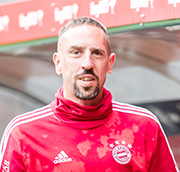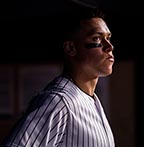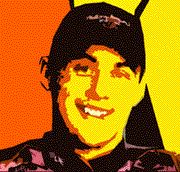In the high-stakes world of European soccer, there are prospects, suspects, projects and rejects. At one time or another, Franck Ribéry fit each of those descriptions. The player development programs of France’s great clubs all missed this diamond in the rough, forcing Franck to zig-zag his way from one bottom-rung club to another until someone finally noticed his outrageous talent. Of course, his outrageous personality had something to do with that. He was a fighter both on and off the pitch. But it was on the field where that spirit made Franck one of the most dangerous players in the game. This is his story…
GROWING UP
Franck Ribéry was born on April 7, 1983, in Boulogne-sur-Mer, France. (Click here for a complete listing of today’s sports birthdays.) The town sits on the English Channel in the northeastern part of the country, and is France’s busiest fishing port. Franck’s father worked construction and the family lived in low-income housing in the Chemin-Vert section of town. There he grew speaking Ch’ti, a kind of patois mix of Flemish and French. This would limit him as a boy, especially in terms of his academic performance.
When Franck was a toddler, the family was in an auto accident and he was badly injured when he smashed though the windshield. Two deep cuts on his face left long scars which are still evident today. Franck and his younger brother, Francois, grew up among tough, hard-drinking, ill-mannered men who loved to watch and play football. Both brothers excelled at the sport from an early age.
Franck was six when he entered the youth program of the local soccer flub, FC Conti, an amateur outfit representing Boulogne-sur-Mer. He worked his way up to the adult squad by age 13, exhibiting exceptional ball control skills and a hard, accurate shot for a player of his small size. In 1996, Franck was invited by coach Jean-Luc Vandamme to play for the development team of Lille OSC, a club in one of France’s largest metropolitan areas. One of the world’s top teams in the post World War II era, Lille was a second-rate club when Franck arrived. Even so, they cut him loose within a couple of years, after he injured his elbow. The club cited behavioral problems and a disregard for his academic responsibilities.
Frank returned home and hooked up with Boulogne US, a fourth-division team. He spent a year on the reserve squad before earning a chance to perform with the senior team in 2000–01 at the age of 17. He scored one goal in four games in his first season as a full-fledged professional. Franck settled into a regular role with Boulogne, playing on the right side as a wing or midfielder. He scored 5 goals in 25 games and caught the eye of Olympique Ales in Southern France. He moved to that club for the 2002–03 season. What Franck found was an organization that struggled on the field and in the front office. He scored just once in 18 games. The team declared bankruptcy after the season and Franck, now 20, began looking for a new job.
Franck ended up signing with Stade Brest, a third-tier club with some promise. Right away, he established himself as the best all-around performer on the team. He scored four times in 37 games, while elevating Brest to Ligue 2 status. Despite the promotion, Franck felt he was ready for Ligue 1 play. Since his contract was only for one year, he was able to leave Brest and catch on with FC Metz, who signed him to a multi-season pact. During his season with Metz, Frank was compared to Robert Pires, who starred for the team before become an international sensation in the late 1990s. Playing for Jean Fernandez—a former Olympic coach—Franck blossomed into a full-fledged midfield star during the 2003–04 season. In August, he was honored as France’s Player of the Month.
Metz was understandably keen on signing Franck to an extension, but they could not come to terms. That winter, after playing just 22 games for Metz, he left the club to finish the year with Galatasaray, the top team in Turkey, which was coached by the legendary Gheorge Hagi. Fans in Instanbul loved Franck’s explosiveness and toughness. Soon he was known affectionately as “Scarface.”
Franck teamed with goal-scorer Hakan Sukur to help Galatasaray finished third in the league, and ultimately reach the championship game against Fenerbahçe. He netted the opening goal of the match and assisted on another as Fenerbahç Galatasaray opened a 3–1 lead. They cruised the rest of the way for a 5–1 victory. Franck was a champion for the first time in his career.
After the finals, Franck began looking for a long-term deal back in France. Fernandez was now with Marseille, and he helped hammer out a generous five-year offer. The only problem was that Galatasaray had picked up the option on Franck’s contract with Metz for 2 million euros—and on paper at least, controlled him for three more seasons. At this point, Franck asked FIFA to intervene, claiming he had not been paid according to his contract in Turkey, and that he had been threatened by a club official with a baseball bat. FIFA decided in his favor, turning down a claim by Galatasaray that Marseille owed them 10 million euros for the continued services of one of Europe’s emerging stars.
ON THE RISE
Franck scored 6 goals in 35 league games with Marseille, and helped the club reach the finals of the Coupe de France with three more goals in elimination games against Le Havre and Rennes. In the championship match against arch rivals Paris Ste.-Germain, Marseille fell, 2-1. In UEFA competition during the 2005–06 season, Franck scored against Lazio, Deportivo Coruna and the Bolton Wanderers. In all, he netted 12 goals in 53 games—by far the most he had ever played in one season. That spring, Franck was named French football’s Young Player of the Year.
Franck also appeared in 10 games for Raymond Domenech’s French national team in 2005–06, including the 2006 World Cup. He played brilliantly, demonstrating fantastic speed and passing ability that resulted in four goals for his team. Franck scored his first international goal during the World Cup. With France trailing 1–0 in a Round of 16 match, he tied the game and then helped Led Blues surge to a 3–1 victory. Patrick Vieira and Zinedine Zidane finished off the Spaniards.
France then upended Brazil 1–0 in the quarterfinals, with Zidane putting on a show. The French star scored the lone goal in France’s semifinal victory over Portugal, vaulting the club into the finals against Italy. This was the game famous for Zidane’s head-butting incident. He had tallied the opening goal, but the score was knotted 1–1 at the end of regulation and remained so after extra time. In the ensuing shootout—which Franck watched from the sideline—Trezeguet was the only player to miss, giving Italy the Jules Rimet Trophy.
Though disappointed by the near-miss, Franck had plenty to smile about after the World Cup. He had distinguished himself on the international stage and, at 23, was not even close to approaching his prime years. Arsenal bid 15 million euros for his services. Real Madrid doubled that offer. Marseille’s response to all comers was thanks, but no thanks. With Franck locked up for five more seasons, they were in the driver’s seat. For his part, Franck seemed happy with the club.
Of course, in French soccer, things can change quickly. Franck found himself the object of extra attention in league games, making it difficult to get good shots. Under pressure to deliver a long-awaited league title to Marseille, Franck began the 2006–07 season in a scoring drought, and then injured his groin in a November game. He had better luck upon his return in early 2007, but then fractured his foot and missed another month. At the end of the regular season, he had only 5 goals in 25 games and Marseille finished as league runner-up. Despite having trouble staying on the field, Franck was absolutely brilliant when healthy. At season’s end, he unseated Thierry Henry as France’s Player of the Year.
Franck was healthy for the Coupe de France competition and, for the second year in a row, he led Marseille to the finals. His goal in the semifinals against Nantes was the deciding tally. Marseille faced Sochaux in the championship match, brimming with confidence. Less than two weeks earlier, Franck and his teammates had dominated them in a league match. In a wild game, the two teams ended 2–2 after regulation, 4–4 after extra time, and Marseille ended up losing in a shooutout
Marseille decided to cash in on Franck after the season and sold him to Bayern Munich for 25 million euros. Franck got a new four-year contract and was given the honor of replacing all-time great midfielder Mehmet Scholl, taking over the number 7 jersey Scholl had worn for 14 years with the team. Franck made an immediate impact, scoring twice in his first game for the Reds and helping them win the preseason German League Cup (now called the DFL Supercup).
It took a couple of months for Franck to meld with his teammates, but once he did he became the most valuable gear in Bayern’s well-oiled machine. He played on the left wing for the club, preferring that side despite being right-footed. It enabled him to make sharp cuts into the middle and shoot or pass with his stronger foot. In the prestigious German Cup, he had two goals and four assists in five games, scoring the deciding goal in the semifinals and setting up Luca Toni’s goal to open the finals against Borussia Dortmund. Bayern Munich took the match, 2–1.
In UEFA Cup competition, Franck was almost unstoppable. He scored three times, including once in a thrilling quarterfinal comeback against Getafe. Unfortunately, that’s as far as Bayern got. In all, Franck played 46 games for his new team and finished with 16 goals and 17 assists. He was named German Footballer of the Year and also French Footballer of the Year, for the second season in a row.
The ensuing summer was not a good one for Franck. He tore ligaments in his left ankle in during a Euro 2008 match in in June against Italy. Franck was unable to take the field again until late September. After regaining his bearings for a month or so, he went on a goal-scoring binge for Bayern, finding the net in five straight league matches. In a December Champions League meeting with Lyon, Franck had a hand in every goal in an exciting 3–2 victory. Bayern finished the 2008–09 strong, losing just 2 of their final 13 matches, but they were edged out of first place by Wolfsburg. Franck finished the year with a total of 14 goals and 19 assists in 34 appearances for Bayern in league and tournament play.
Heading into the summer of 2009, Franck’s future was the subject of intense speculation, as several teams were said to be offering Bayern 60 million euros or more for his services. Bayern out an end to the rumors by announcing that, yes, Franck was available—but not for less than 100 million euros. That ended all discussion—not just about a possible transfer, but about a supposed rift between Franck and manager Louis van Gaal.
The 2009–10 season found Franck again dealing with an injury, this time a sore knee. Eventually, Bayern decided to rest him until after the break. Franck went along with the plan, which meant he also had to miss an important World Cup qualifier against Ireland. Upon his return in January, Franck was back to his old, aggressive self, helping Bayern reach the Champions League final. Unfortunately, he was not allowed to play in the title match against Inter Milan. Franck had been slapped with a suspension for a hard foul on Lyon’s star striker, Lisandro, in the semifinals. Bayern fell to Inter, 2–0.
MAKING HIS MARK
As France prepared for World Cup 2010, Franck was looked upon by many as the heir to Zidane. He brought the crowd to its feet with his pinpoint passes and incredible dribbling. His fast feet and quick moves could make world-class defenders look like raw rookies. Unfortunately, once the Group stages started, Les Blues seemed oddly out of sync. They began the tournament with a scoreless tie against Uruguay, followed by a 2–0 loss to Mexico and a 2–1 loss to host country South Africa. French fans were astonished that their team—a finalist in 2006—failed to make it out of their group four years later. Franck was heavily criticized for this failure.
Among the voices accusing him of a lack of leadership was World Cup legend Just Fontaine, the patron saint of French football. Among the complaints was that Franck failed to properly incorporate the skills of dynamic young midfielder Yoann Gourcuff into the team’s attack. Adding to the World Cup turmoil was the dismissal of Nicolas Anelka after the loss to Mexico, and the boycotting of a subsequent team practice by Franck and others in protest. After the French defeat, Franck was slapped with a three-game ban from international matches by the French Football Federation.
Franck began the 2010–11 Bundesliga season completely healthy for the first time since joining Bayern Munich. However, that did not last long. He injured his ankle in September and sat out two months, and then, in early 2011 he was out again, this time with a leg injury. Back in the lineup in February, Franck went on one of his patented tears. Over the course of one amazing month, he was all over the field, setting up teammates for beautiful goals and scoring several himself—including three in a 6–0 drubbing of Hamburger SV. In the next game, he scored the game-winner against SC Freiberg. The late-season surge helped him finish with a very respectable 11 goals in 32 games in league and tournament play.
Franck managed to stay healthy in 2011–12, and he was magnificent. His passes set up Bayern teammates for easy goals, and he scored several game-winners himself as Bayern surged into the league lead. Franck was just as good in helping the Reds advance in Champions League play. Opponents began keying on Franck, which limited his scoring but not his field generalship. He picked up the pace again in February and March, as Bayern moved closer to the finals of the German Cup. Unfortunately, Bayern fell in the title game to Borussia Dortmund. Hopes of a Champions League title faded when Franck went off with an injury in the final against Chelsea. Didier Drogba nailed him with a hard tackle. Drogba scored the tying goal in a 1–1 game and went on to net the winner in a 5–4 shootout. As Bayern’s season closed, Franck finished with 12 goals in 32 regular-season appearances, and another 3 scores in tournament play.
The 2012–13 season was a great one for Frank and his Munich teammates. He scored 10 goals in 27 league games and another in tournament play. The season began with a 2–1 win over Borussia Dortmund in the DFL Supercup, followed by eight straight victories to start the Bundesliga campaign. Bayern ran away with the league title, losing just once and wrapping up first place earlier than any team in history. The team’s defense was superb, as it allowed a mere 18 goals. Franck and his teammates also reached the Champions League final for the third time in four years, and this time they were victorious. They completed the season with a victory in the German Cup. They were the first team ever to win the German “triple.”
Back in the good graces of the national team, Franck scored a goal for France in a 3–2 comeback win over Iceland in late May. It was his first tally for the national team in three years. During the next week he scored game-winning goals against Serbia and Estonia. That probably helped seal the deal in the final voting for UEFA’s Best Player in Europe award. Franck edged Ronaldo and Messi for the honor. As an additional thrill, Franck was presented with the award by one of his heroes, Michel Platini.
As the 2013–14 season began, Franck led Bayern Munich into battle knowing that he was likely to remain with the club for the remaining prime years of his career. A new coach, Barcelona legend Pep Guardiola, took over and, almost immediately, he led Franck and his teammates to Bayern’s first-ever UEFA Super Cup title, as they defeated Chelsea on penalty kicks, and the Club World Cup championship just before Christmas 2013. Franck was named MVP of the final in a 2–0 victory over Raja Casablanca. Early in 2014, Franck placed third in the Ballon D’Or behind Cristiano Renaldo and Messi—FIFA’s soccer MVP trophy.
At this point, Franck was ahead of his usual scoring pace. By the end of March, he was averaging a goal every other game for Bayern Munich and had 5 goals and 5 assists in his first 8 games for the French national team. He missed several games in February after undergoing a minor surgical procedure to relieve pressure on a nerve in his buttocks, but finished the Bundesliga season with 10 goals in 22 games, helping Bayern to a first-place finish. He was projected to start for the French national squad at the 2014 World Cup, but a nagging back injury forced him to step aside on the eve of the competition. He likened the decision to “a death in the soul.”
Nevertheless, the rise of Franck from the fringes of French soccer to European Player of the Year status was one of the truly remarkable stories in the sport. It showed that talent, drive and perseverance can make up for a poor pedigree—and turn an outcast into a champion. Frank’s blend of intelligence, cunning, skill and aggression made him exciting to watch, especially when he faced tightly packed defenses.
Knee and ankle injuries kept Franck off the pitch for significant stretches over the next five seasons. When healthy, however, he could still do the near-impossible. A jaw-dropping 2016 goal on a bicycle kick in a Bundelsiga meeting with Frankfurt was one of the more notable highlights of those injury-plagued years. Near the close of the 2018–19 season, Bayern announced that Frank would be moving on. He finished his career with the club with 124 goals in 425 games. Bayern won its fourth German Cup/DFB-Pokal title in seven years in Frank’s final campaign.
During the summer of 2019, Frank, now 36, signed with Fiorentina and played two years for the Italian club. Serving primarily as a playmaker, he was named the club’s Player of the Year in his first season. In 51 matches, he scored 5 times. In 2021–22, Franck suited up for another Serie A club, Salernitana, based in Salerno—which had just risen from Serie A after more than two decades in Italy’s B league. Frank was named team captain and, after a dangerously slow start, he led the team to 18 points in its final 15 matches to stave off relegation in what the sporting press hailed as a miracle finish.
FACTS
- Franck converted to Islam in 2006 after marrying his wife, Wahiba. They first met as teenagers in his old Chemin-Vert neighborhood. He raises his hands to Allah before every match.
- In 2007–08, Franck became just the second non-German to be named German Footballer of the Year. The first was Brazilian striker Ailon, in 2003–04.
- Franck’s Muslim name is Bilal Yusuf Mohammed.
- Franck and Wahiba have three children—two daughters and a son.
- In 2010, Bayern Munich inked Franck to a deal that pays 10 million euros a year through the 2014–15 season. It was the highest salary in team history.
- Turkish fans called Franck “Ferrari-bery” because of his quick acceleration.
- Franck opened an alcohol-free bar in 2012 in Boulogne-sur-Mer and named it O’Shahiz after his two daughters, Shahinez and Hizya. It serves juices and soft drinks.
- In a 2005 match against Nantes, Franck scored the game-winning goal from 35 meters. The shot was voted best of the year by French fans.
- Franck’s Young Player of the Year award in 2006 put him in elite company. Other winners include Zinedine Zidane, Thierry Henry, David Trezeguet and Eden Hazard.
- At 23, Franck was the youngest member of the 2006 World Cup squad. Only three players were under age 25.
- In 2012, Franck and Bayern teammate had a fight in the dressing room at halftime of their Champions League victory over Real Madrid. Franck apologized to the team after the altercation.
- In 2006, the chairman of Marseille rival Olympique Lyonnaise was accused of tampering with Franck during the World Cup.
- In 2009, Franck scored the winning goals in back-to-back 1–0 victories over Lithuania.
- he 25 million euros Marseille received from Bayern Munich for Franck set a club record.
- Franck finished third behind Cristiano Ronaldo and Lionel Messi in 2008 Onze D’Or voting for Europe’s top player.
- Franck is a great practical joker. He has pulled pranks on almost every Bayern teammate. His favorite target is Arjen Robben.
- Although he was rarely at 100% for more than a month or two at a time, Frank was a key contributor to Bayern Munich’s seven straight league titles from 2013 to 2019.
MY SAY
“We won everything, so why should I not have this award?”
“I play how I feel. I don’t have a set way of playing. I get going, looking to create danger.”
“Nobody thought I could do it. But I worked and I started to ask questions of myself. I still do.”
“Winning the Champions League has always been my dream and I will do anything to achieve it.”
“The whole team feels pressure but it’s even more difficult for the coach.”
“As a kid, I spent all my time with Muslims. It is my choice. No one told me to do it. I prefer to keep my reasons to myself.”
“Sure, Messi and Ronaldo have scored more goals than me. But I won the treble!”
“It’s important to always be smiling, to wake up and feel good.”
“What has happened to me shows that anything can happen in football, that you can come from a long way down to realize your dreams.”
THEY SAY
Messi is Messi and Ribéry is Ribéry. Nevertheless they do have something in common: they surprise you when you watch them play.
Franck has great anticipation. He analyses three times faster than others. On the pitch, he has all the problems worked out while others are still pondering.
He’s the jewel of French football.
Franck just loves life. He’s the kind of player that makes an impression every time he plays.
He is on the verge of becoming one of the greats of French football.
He’s up there with ionel Messi and Cristiano as one of the best players in the world.






Comments